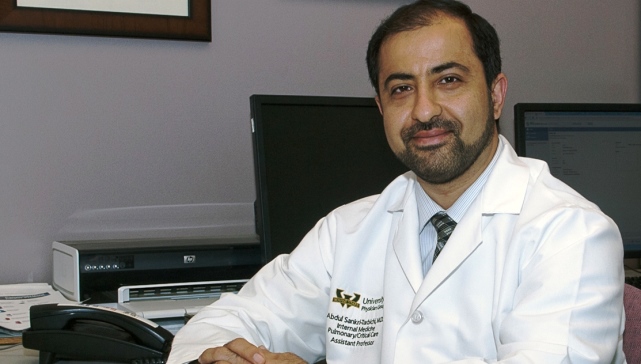
The National Institutes of Health has awarded a two-year, $231,000, exploratory grant to Wayne State University School of Medicine Associate Professor of Medicine Abdulghani Sankari, M.D., Ph.D., to test a new automated program that assesses respiratory and cardiac disturbances during sleep on long-term outcomes related to cardiovascular disease-related, or CVD, events.
CVD events include death, heart attacks and heart failure, and procedures such as angioplasty, stent implants, pacemakers, bypass or defibrillation, said Dr. Sankari, the principal investigator on the grant and co-inventor of the program, which detects respiratory-related heart accelerations during sleep that can improve the accuracy of diagnosis with an electroencephalogram or desaturation threshold. The program utilizes a proprietary method of automatic detection of heart rate accelerations that can be translated into an executable program or a plug-in for sleep-scoring software.
The program could be used in any sleep study across the world, he added, and may lead to a paradigm shift in the way sleep medicine physicians diagnose sleep-disordered breathing and measure the risk of cardiovascular disease by providing the necessary platform for future clinical and outcome studies to assess the disorders' impact, and associated physiological changes, on patient heart health and survival.
"Sleep-disordered breathing traditionally includes apneic and non-apneic respiratory events if associated with desaturation or arousals. However, SDB encompasses a spectrum of respiratory abnormalities that could disrupt normal physiology and affect clinical outcome," he said.
The grant (R21 HL140447-01) is from the National Heart, Lung and Blood Institute, and includes $122,356 in funding for the project's first year, when Dr. Sankari, as principal investigator, will assemble a team of investigators at WSU and University of Wisconsin-Madison, and begin a secondary analysis of data from a large community cohort in collaboration with the Wisconsin Sleep Cohort.
The study also will provide necessary data for future interventional and therapeutic studies to modulate the risk associated with SDB on the cardiovascular system and on metabolism.
Dr. Sankari is program director of the Pulmonary Critical Care Medicine Fellowship at WSU, part of the Department of Internal Medicine's Division of Pulmonary, Critical Care and Sleep Medicine.
While this is Dr. Sankari's first R21 grant, he is the principal investigator on several ongoing and pending extramural grants, including a private grant from WSU's Cardiovascular Research Institute, which provided seed funding to support the NIH R21 and obtain preliminary data.
The study team includes his co-inventors, Dr. Sankari's mentee Scott Maresh, a third-year WSU medical student; and Department of Internal Medicine Chair M. Safwan Badr, M.D.
"I would like also to thank my colleague from University of Wisconsin, Dr. Paul Peppard, and his team, Dr. Erika Hagen and Laurel Finn, who are co-investigators on this R21 award and for providing the access to the Wisconsin cohort database and assisting in the statistical analysis," Dr. Sankari said.